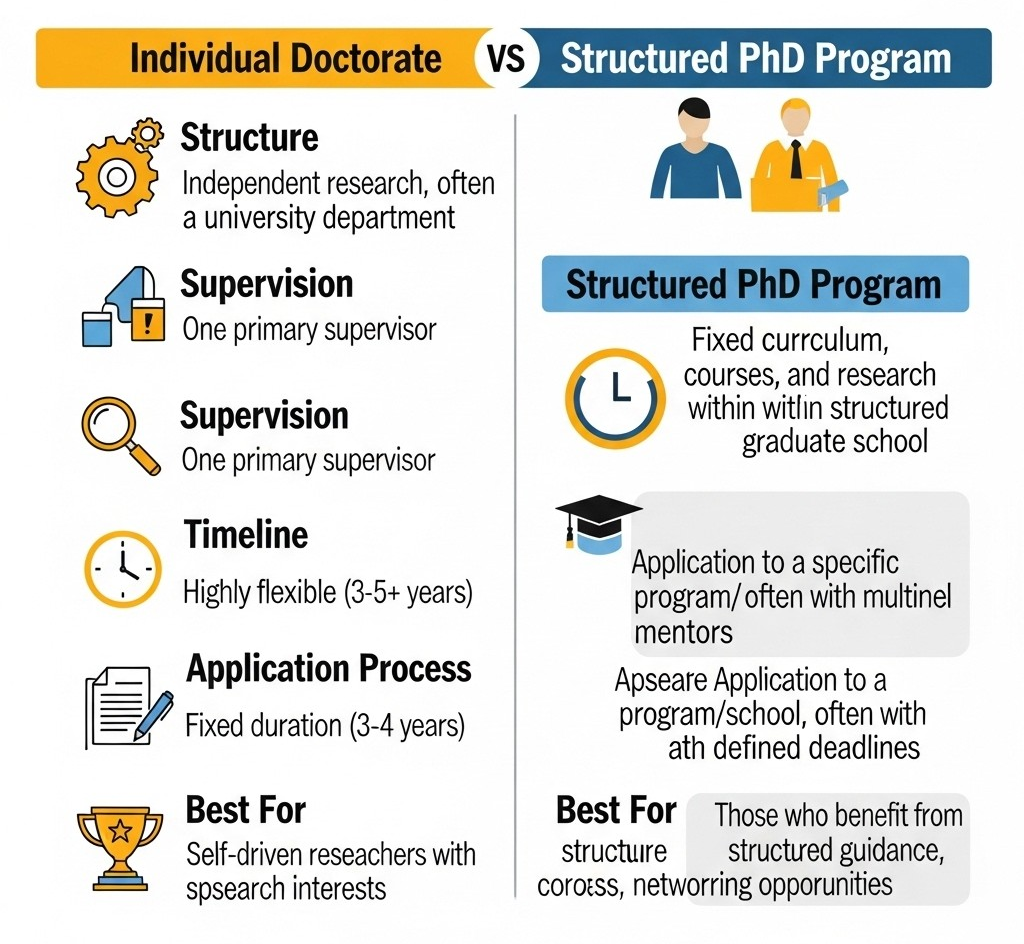Embarking on the journey to secure a PhD in Germany for international students can feel like navigating a complex maze, but it’s a path that leads to one of the world’s most esteemed research landscapes. You’re likely dreaming of tuition-free universities, groundbreaking research opportunities, and a vibrant European experience. The good news? It’s all within your reach. This guide will demystify the admissions criteria for 2026, breaking down the process into clear, actionable steps to turn your academic aspirations into reality.

Securing a PhD position in Germany is a marathon, not a sprint. It requires meticulous preparation, persistence, and a genuine passion for your research. I’ve seen many successful applicants who stood out not just because of their grades, but because of their clear vision and professional approach. Every document you prepare, every email you send, is a reflection of you as a future researcher.
Why Pursue a PhD in Germany? 🇩🇪
Before we dive into the “how,” let’s reaffirm the “why.” Germany isn’t just a land of poets and thinkers (Das Land der Dichter und Denker); it’s a global research powerhouse. Most public universities here charge no tuition fees for doctoral studies, a huge financial advantage. You’ll find a vast network of universities and non-university research institutions like the Max Planck Society and Fraunhofer-Gesellschaft, all offering world-class facilities and supervision. The environment is international, the quality of life is high, and a German doctorate is a mark of distinction respected worldwide.
The Two Paths to a German PhD: Individual vs. Structured
Understanding the German doctoral system is the first critical step. Unlike a one-size-fits-all model, Germany offers two distinct pathways for your PhD. Choosing the right one depends entirely on your working style and research goals.
The Traditional Path: The Individual Doctorate
This is the classic, most common route. Think of it as an apprenticeship with a master artisan.
- How it works: You work independently on your thesis under the guidance of a single professor, your supervisor (Doktorvater or Doktormutter).
- Flexibility: This path offers immense freedom. You set your own timeline (typically 3-5 years) and research direction.
- Best for: Self-motivated, independent researchers who have a very specific research topic in mind and thrive with autonomy.
- The Challenge: You are responsible for finding and convincing a professor to supervise you before you can enroll.
The Modern Path: Structured PhD Programs
These are more akin to the PhD programs found in the UK or the US, often conducted in English and designed for international students.
- How it works: You’re part of a cohort of doctoral candidates within a graduate school or research training group. The program includes a curriculum of workshops, seminars, and team-based activities alongside your thesis work.
- Support: You benefit from a team of supervisors and a built-in network of peers.
- Best for: Students who prefer a more guided approach, value collaborative work, and appreciate the support of a formal program structure.
- The Application: You apply directly to the program, which has a set number of available positions and a more standardized application process.

Core PhD Admissions Criteria in Germany for Foreign Applicants
While requirements can vary slightly between universities and programs, the core criteria for 2026 remain consistent. Here’s what you’ll need to have in order.
Academic Qualifications: Your Master’s Degree is Key
Your previous academic performance is the single most important factor. German universities look for excellence and a strong foundation in your field.
- Recognized Master’s Degree: You must hold a Master’s degree (or equivalent, like a German Magister or Diplom) from a recognized university that is comparable to a German Master’s. You can check if your university is recognized in Germany on the Anabin database, an official resource for evaluating foreign qualifications.
- Excellent Grades: While there’s no universal GPA cutoff, you’ll need to have grades that are significantly above average. German grades are on a scale from 1.0 (excellent) to 4.0 (pass), and a grade of 2.5 or better is generally expected.
Proving Your Language Proficiency
You can’t do groundbreaking research if you can’t communicate it. Your language skills—either English or German—must be officially certified.
- For English-Taught Programs: The majority of structured PhD programs and many individual projects in the natural sciences are conducted in English. You’ll typically need to provide scores from a standardized test like the IELTS (usually 6.5 or higher) or TOEFL iBT (usually 90 or higher).
- For German-Taught Programs: For research in the humanities and social sciences, German is often required. You’ll need to demonstrate advanced proficiency with a certificate like the TestDaF (level 4 in all sections) or DSH (level 2 or 3).
The All-Important Research Proposal
For an individual doctorate, your research proposal is your masterpiece. It’s your chance to prove you have a viable, exciting research idea and the skills to execute it. In my experience advising students, a compelling proposal is what separates a “maybe” from a “yes” when approaching a potential supervisor.
A strong proposal (usually 5-10 pages) should include:
- A clear research question and hypothesis.
- A review of the existing literature in the field.
- Your proposed methodology and research plan.
- A realistic timeline for your project.
Finding and Securing a Supervisor (Doktorvater/Doktormutter)
This is the most crucial step for the individual doctorate track. A supervisor is not just an advisor; they are your gateway to the university.
- Search Strategically: Use online databases like the DAAD PhD Germany database, Hochschulkompass, and university websites to find professors whose research interests align with yours.
- Make a Professional First Contact: Craft a concise, professional email. Introduce yourself, state your research interest (and how it connects to their work), and attach your CV and research proposal. Address them by their formal title (e.g., “Dear Professor Schmidt”).
- Be Patient and Persistent: Professors are incredibly busy. If you don’t hear back in a few weeks, a polite follow-up is acceptable.
Your Step-by-Step Application Roadmap for 2026
Feeling overwhelmed? Let’s break it down into a simple checklist.
- Define Your Research & Choose Your Path: Settle on a research topic you’re passionate about and decide whether an individual or structured PhD is the right fit for you.
- Prepare Your Core Documents: Start gathering your essentials: academic transcripts, degree certificates, CV, proof of language proficiency, and a draft of your research proposal.
- Find a Supervisor or Program: Begin your search for the right professor or structured program at least 9-12 months before your intended start date. This step takes time!
- Secure Funding: Concurrently, explore funding options. Many supervisors will only accept you if your funding is secure. The DAAD Scholarship Database is the best place to start.
- Get the Acceptance Letter: Once a supervisor agrees to take you on, they will provide a letter of acceptance (Betreuungszusage). For structured programs, you’ll receive an official offer letter.
- Enroll at the University: With your acceptance letter in hand, you can formally apply for admission to the university’s doctoral committee and enroll as a PhD student.
- Apply for Your Visa: As a non-EU citizen, you will need to apply for a German student visa or a research visa. Start this process as soon as you have your university acceptance, as it can take several months.

Acing Your Application: The Ultimate Guide to 110 ICAO Fellowships and 10 Scholarships 2025
Navigate Your Future: The Ultimate Guide to Algeria Undergraduate Scholarships 2025
FAQ
Q1:Can I do a PhD in Germany without a Master’s degree?
Generally, a Master’s degree is a mandatory prerequisite for admission to a doctoral program in Germany. In very rare cases, some universities offer “fast-track” programs for exceptionally qualified Bachelor’s graduates. However, these are highly competitive and usually require the completion of Master’s-level coursework before you can begin your dissertation. For planning purposes, you should consider a Master’s degree an essential requirement.
Q2:Are there really no tuition fees for PhDs in Germany?
That’s correct for the vast majority of programs. Public universities in Germany do not charge tuition fees for doctoral studies, regardless of your nationality. You are, however, required to pay a semester contribution (Semesterbeitrag) each semester, which typically costs between €150 and €350. This fee covers administrative services and usually includes a public transportation pass for your city, offering great value. Be aware that private universities may have their own fee structures.
Q3:How long does it take to get a PhD in Germany?
The duration depends on your chosen path. Structured PhD programs are typically designed to be completed within three to four years. For an individual doctorate, the timeline is more flexible and self-paced, but most candidates complete their research and dissertation in three to five years. The final duration depends on your field, the scope of your research, and your funding.
Q4:Do I need to speak German to do a PhD in Germany?
Not necessarily. English is the common language of research, especially in the natural sciences, technology, and engineering fields. Many structured PhD programs are taught entirely in English to cater to international students. However, if your research is in the humanities, German literature, or social sciences, advanced German language skills will likely be required. Even if your program is in English, learning basic German is highly recommended to enrich your daily life and social integration.
Q5:Can I work while doing my PhD in Germany?
Yes. Many doctoral candidates are employed by their university as research associates (wissenschaftliche Mitarbeiter), in which case the research is their job. If you are on a scholarship, you must check the specific regulations, as some may have restrictions on additional work. As a non-EU student, your residence permit will generally allow you to work up to 140 full days or 280 half days per year outside of your academic work.
Q6:What are the application deadlines for PhD programs in Germany?
This is a key difference between the two types of doctorates. Structured PhD programs have fixed application deadlines, often once or twice a year. You must check the specific program’s website for these dates. For an individual doctorate, there are typically no set deadlines. You can start at any time of the year, provided you have found a supervisor and completed the university’s enrollment process.










